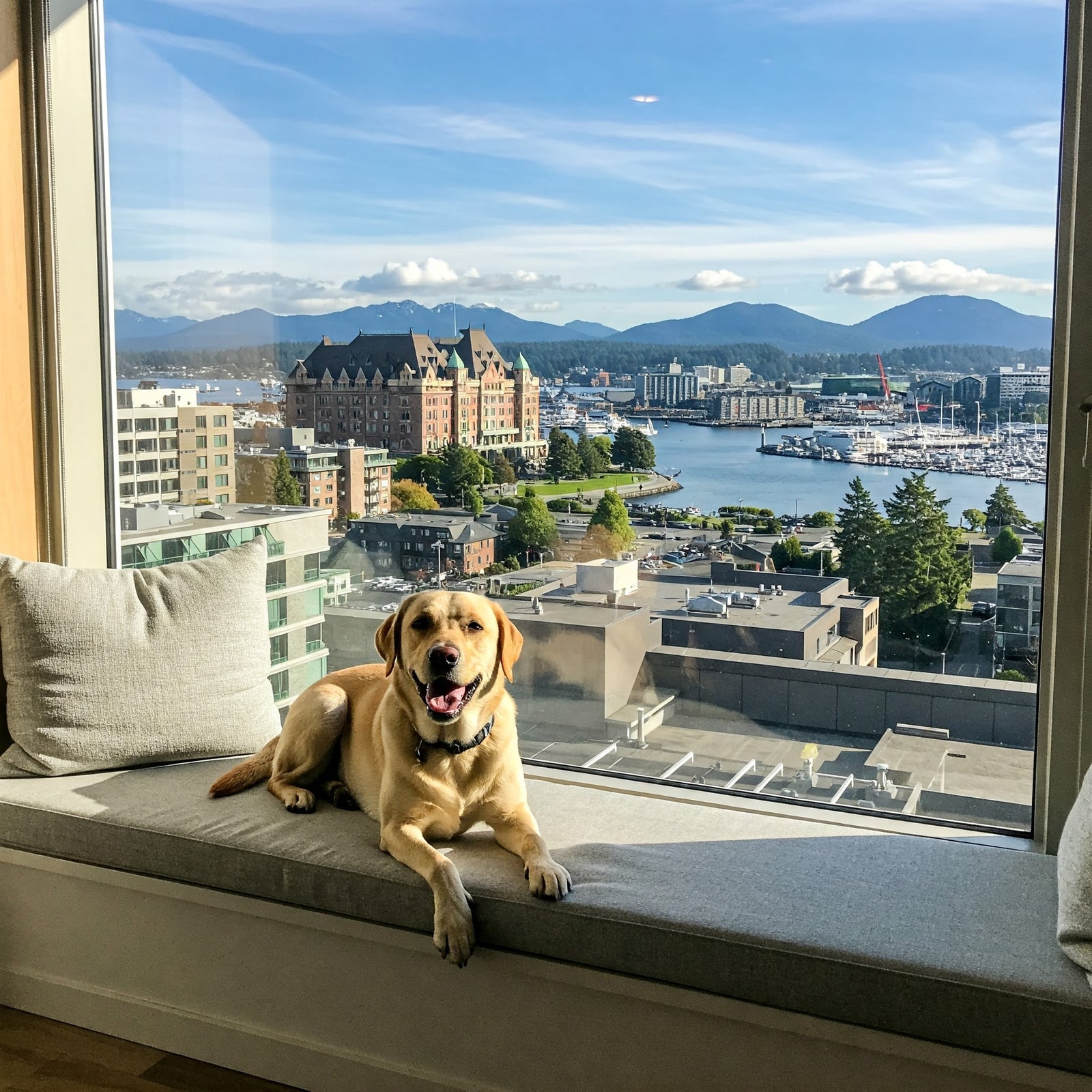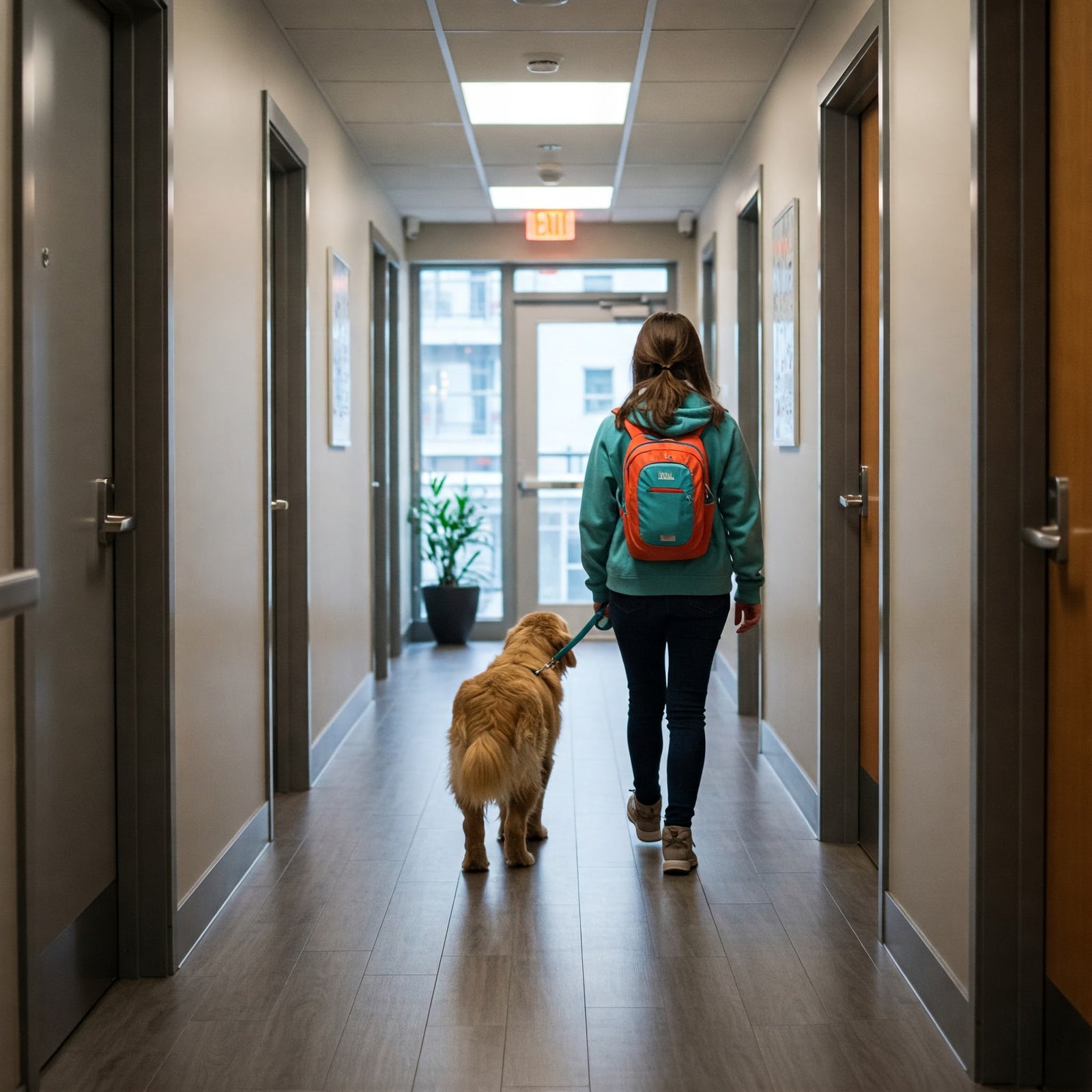Let's face it, for many of us in Victoria, our pets aren't just animals – they're furry (or sometimes feathered or scaled!) members of the family. Choosing a home often means choosing a home for them too. If you're dreaming of condo living in our beautiful city, but can't imagine life without your beloved companion, you're not alone! However, navigating the world of strata corporations and their rules about pets can feel a bit like herding cats.

Finding a condo that welcomes your pet is absolutely achievable, but it requires careful attention and due diligence. As REALTORS® with the Vibe Collective, we help clients through this process every day. The key lies in understanding strata bylaws – the specific rules governing each condominium building. These bylaws dictate whether pets are allowed, and if so, under what conditions. This isn't just a casual agreement; it's governed by provincial legislation, specifically the Strata Property Act (SPA) of British Columbia.
So, grab a cup of tea (and maybe give your pet a friendly scratch behind the ears), and let's dive into what you need to know about pets in Victoria condos.
Welcome to Strata Living: Understanding the Basics
First, what exactly is a strata? When you buy a condo (or strata lot), you're not just buying the space within your unit's walls. You're also buying into a shared ownership structure. You become part of a strata corporation, which collectively owns and manages the common property (like hallways, elevators, lobbies, grounds, amenities) and common assets of the building or development.
To manage this shared ownership and ensure harmonious living, the strata corporation creates and enforces bylaws and rules. Think of these as the community's constitution. They cover everything from noise levels and parking to renovations and, importantly, pets. Every owner, tenant, and visitor must abide by these bylaws.
It's crucial to understand that strata bylaws are legally binding documents. They are registered with the Land Title Office and can only be changed by a 3/4 vote of the owners at a properly convened general meeting. This means the rules aren't arbitrary whims; they represent the collective decisions of the homeowners in that specific building.
The most important takeaway? Strata bylaws vary *dramatically* from one building to another. One condo might welcome two large dogs, while the one next door might prohibit pets entirely or only allow one small cat. There is no "standard" pet policy across Victoria. Assuming a building is pet-friendly based on its appearance or location is a common mistake.
The Law of the Land: The Strata Property Act and Pets
The foundation for how stratas regulate pets is found in the Strata Property Act (SPA). Specifically, Section 123 addresses pet bylaws directly.
Under the SPA, a strata corporation has the right to adopt bylaws that can:
- Prohibit pets entirely: A strata can vote to not allow any pets.
- Restrict pets: This is more common and can include limitations on the number, size, type, or breed of pets allowed.
- Require registration: Bylaws can mandate that owners register their pets with the strata council.
- Enforce responsibility: Bylaws routinely require owners to ensure their pets do not cause disturbances (noise), damage property, or create nuisances (like not cleaning up waste). Owners are typically held financially responsible for any damage their pet causes to common property.
While stratas have significant power to regulate pets, these bylaws must be reasonable and enforced consistently among all residents. They cannot contradict other laws, like the BC Human Rights Code (which we'll discuss later regarding assistance animals).
The BC government provides a set of Standard Bylaws as a default template. While Standard Bylaw 3(4) historically allowed one dog or cat (or one of each), most strata corporations create their own custom bylaws, often significantly modifying or replacing the standard ones, especially regarding pets. Never assume a building uses the Standard Bylaws without checking!
If disputes arise over pet bylaws (or any strata matter) that cannot be resolved internally, owners or the strata corporation can turn to the Civil Resolution Tribunal (CRT). The CRT is an online tribunal designed to handle strata and small claims disputes in British Columbia, offering a more accessible alternative to traditional court proceedings.
Decoding Pet Bylaws: Common Restrictions in Victoria
When you review the bylaws of a specific Victoria condo building, you'll likely encounter one or more of the following types of pet regulations:

- "No Pets" Bylaws: While becoming less common for strata corporations to *enact* today due to market demand and human rights considerations, existing "no pets" bylaws are generally enforceable (subject to the grandfathering rule discussed below and exceptions for assistance animals).
- Number Restrictions: Very common. Bylaws often limit households to one or two pets total (e.g., "one dog or one cat," "a maximum of two pets," "one dog and one cat").
- Size or Weight Restrictions: These can be tricky. You might see limits like "pets under 25 pounds at maturity" or "pets must be capable of being carried." Enforcement can be challenging – who weighs the dog, and when? What if a puppy grows larger than expected? It's important to consider the practicality of these rules.
- Type Restrictions: Most bylaws allowing pets specify common domestic animals like dogs and cats. Birds, fish in aquariums (often with tank size limits), and small caged mammals (hamsters, guinea pigs) might be permitted. Reptiles and exotic animals are almost always prohibited.
- Breed Restrictions: Some older bylaws might list specific breeds deemed "aggressive." These are increasingly controversial and less common, as responsible ownership is generally seen as more critical than breed. However, they can still exist, so check carefully.
- Registration and Approval: Many stratas require you to formally register your pet with the council, providing details like breed, size, and sometimes even a photo. Some may request a brief "meet and greet," though formal "pet interviews" are less common and their enforceability can be debated.
- Behavioural Rules: Expect clauses requiring pets to be leashed and under control at all times on common property (hallways, elevators, grounds). Rules about promptly cleaning up pet waste are standard. Excessive noise (persistent barking) that disturbs neighbours is usually prohibited and can lead to complaints and potential fines or action from the strata council.
The "Grandfather" Clause: Protecting Existing Pets
What happens if you live in a pet-friendly building, and then the strata corporation votes to change the bylaws to restrict or prohibit pets? Thankfully, the Strata Property Act provides some protection.
Section 123(2) of the SPA states that a pet bylaw passed by a strata corporation that prohibits or restricts pets does *not* apply to a pet living with an owner, tenant, or occupant *at the time the bylaw is passed*. This is often referred to as the "grandfathering" clause.
This means your current pet can continue living with you even if the rules change. However, this protection is tied to that *specific animal*. If your grandfathered pet passes away or no longer lives with you, you cannot replace it if doing so would violate the *new* bylaw. Any future pets would need to comply with the pet regulations in effect at that time.
A Crucial Distinction: Assistance Animals vs. Pets
This is a vital area where strata bylaws intersect with human rights law. It's essential to understand the difference between a pet and a legally recognized assistance animal.
In British Columbia, the Guide Dog and Service Dog Act defines and provides rights for individuals with disabilities who rely on certified guide dogs (for visual impairment) or service dogs (trained to perform specific tasks related to a person's disability). These dogs are not considered pets.
Under the BC Human Rights Code, strata corporations have a duty to accommodate residents with disabilities up to the point of undue hardship. Generally, this means a strata corporation *cannot* prohibit a resident from living with their certified guide or service dog, even if the building has a "no pets" bylaw. Denying housing based on the need for a certified assistance animal would likely be considered discrimination.
Residents needing such accommodation must typically provide proof of certification for their guide or service dog. The process involves demonstrating the need related to a disability and that the animal is appropriately certified under the provincial legislation.
The status of "emotional support animals" (ESAs) is more complex under BC strata law. Unlike certified guide/service dogs, ESAs do not have the same explicit protections under the Guide Dog and Service Dog Act. While the duty to accommodate under the Human Rights Code still applies, requests for ESAs are assessed on a case-by-case basis. A resident would typically need to provide medical evidence demonstrating a disability-related need for the animal and that having the animal is necessary for them to have equal access to housing. Stratas must consider these requests seriously but can request sufficient information to assess the need and potential accommodation options. It's not an automatic approval, and disputes may end up before the CRT or Human Rights Tribunal.
The Buyer's Quest: Finding Your Pet-Friendly Paradise
So, you're ready to buy a condo in Victoria, and Fido or Whiskers is part of the deal. How do you ensure you find a home where they're welcome?
1. Partner with Your REALTOR®: This is where having an experienced REALTOR® from the Vibe Collective truly helps. We understand the local market and the nuances of strata living. We can help you filter searches and identify buildings *likely* to meet your pet needs, but more importantly, we guide you through the crucial due diligence process.
2. Use MLS® Cautiously: The MLS® (Multiple Listing Service®) system often includes fields indicating if pets are allowed ("Yes," "No," or "Restrictions"). While helpful as an initial filter, **never rely solely on this information.** It can be outdated, inaccurate, or lack critical details about restrictions.
3. Due Diligence is Non-Negotiable:** The *only* way to be certain about a building's pet policy is to obtain and thoroughly review the *current, official strata documents*. This is typically done *after* you have an accepted offer on a property, as a condition (subject) of your purchase.
4. The Document Review Process: As your REALTORS®, we will request a package of essential strata documents from the seller or strata management company. This package should always include:
- Current Bylaws: Read the specific section on pets *very* carefully. Note any restrictions on number, size, type, etc. Check the date they were last amended.
- Rules: Sometimes, day-to-day regulations (like leash rules) are in separate "Rules" rather than bylaws. Review these too.
- Strata Council Meeting Minutes: Review minutes from the past year or two. Look for any discussions about pet issues, complaints, proposed bylaw changes, or enforcement actions. This gives you insight into how pet rules are handled in practice.
- Form B Information Certificate: This document provides a snapshot of the strata lot and corporation, including current monthly fees, any outstanding judgments against the strata, and whether the owner owes any money. It also confirms the bylaws provided are the current ones.
Pro Tip: Don't just take the seller's or listing agent's word for it regarding pet rules. Memories can be faulty, and rules can change. Always insist on reviewing the official, registered bylaws and current rules as part of your subject removal process.
Living Together Harmoniously: The Responsible Condo Pet Owner
Once you've found your perfect pet-friendly condo, being a responsible owner is key to maintaining harmony with your neighbours and the strata corporation.
- Scoop the Poop (and More): Always clean up after your pet immediately, whether on common property or city sidewalks. Carry waste bags!
- Leash Up: Keep your pet leashed and under control in all common areas – hallways, elevators, lobbies, parking garages, and grounds. This is usually a mandatory rule.
- Quiet Enjoyment: Manage excessive noise. Prevent constant barking, whining, or scratching that could disturb neighbours, especially during night hours. Training or anti-anxiety aids might be necessary for some pets.
- Prevent Damage: Don't let your pet scratch doors, chew on landscaping, or damage carpets in common areas. You'll likely be responsible for repair costs.
- Register if Required: If the bylaws require pet registration, comply promptly.
- Be Neighbourly: A friendly introduction can go a long way. However, be mindful that not everyone is comfortable around animals.
- Licensing and Vaccinations: Ensure your pet's vaccinations are current and they are licensed according to municipal regulations (e.g., City of Victoria Animal Licensing).
What if the Bylaws Change Later?
As mentioned, strata bylaws can be amended by a 3/4 vote of owners. If you move into a building that allows pets, and later the owners vote to restrict or prohibit them, remember the "grandfathering" clause (SPA Section 123(2)). Your specific pet that was living with you *when the bylaw passed* is protected and can stay. However, any *future* pets you might wish to get would be subject to the new, more restrictive bylaw.
Changing bylaws requires notice and a formal vote at a general meeting, so it's rarely a complete surprise. Staying informed by reading strata communications and attending meetings is always a good idea.
Finding Your Fur-ever Condo Home
Bringing a pet into your condo life in Victoria involves extra steps, but it's far from impossible. The key is thorough research and understanding the specific rules of the strata corporation *before* you commit to buying.
Navigating strata documents and understanding the implications of bylaws can be complex. That's why working with knowledgeable REALTORS® who understand the local strata landscape is so important. At the Vibe Collective, we're committed to helping you find a home that's perfect for *everyone* in your family – two-legged and four-legged alike.
If you're ready to start your search for a pet-friendly condo in Victoria, get in touch with us today! We'd love to help you and your companion find your place in this beautiful city.
Disclaimer: This blog post provides general information about pets in strata properties in British Columbia as of April 2025. It is not intended as legal advice. Strata bylaws and legislation can change. Buyers should always conduct thorough due diligence, review current strata documents, and consult with legal professionals if necessary before purchasing a strata property. REALTORS® are licensed under the BC Financial Services Authority and adhere to rules set by the Victoria Real Estate Board, BC Real Estate Association, and Canadian Real Estate Association.

